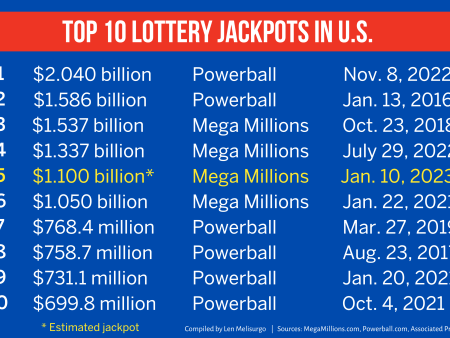Learn about the varying legal age requirements for buying lottery tickets online, verification methods, and the importance of adhering to regulations for a safe, responsible gaming experience. Top Ten Lottery
Is There an Age Requirement to Buy Lottery Tickets Online? Understanding the Legal Guidelines
Is There an Age Requirement to Buy Lottery Tickets Online? Understanding the Legal Guidelines
In an era where the convenience of online transactions has extended to virtually every aspect of daily life, the world of lottery ticket purchases is no exception. With just a few clicks, individuals can now participate in lotteries from the comfort of their own homes. However, this ease of access raises important questions regarding legal restrictions and regulations. Is there an age requirement to buy lottery tickets online? Understanding the legal guidelines surrounding this issue is crucial, as it ensures that participants are adhering to the laws designed to protect vulnerable populations and maintain the integrity of the lottery system. This article delves into the various age-related regulations for online lottery ticket purchases, providing a comprehensive overview for potential players and concerned parties alike.
When it comes to buying lottery tickets online, age requirements can vary significantly from one country to another. In the United States, for example, the legal age to purchase lottery tickets is typically 18 years old, although some states have set the minimum age at 21. Similarly, in the United Kingdom, participants must be at least 18 years old to engage in online lottery activities. These regulations are put in place to protect younger individuals from the potential risks associated with gambling and to ensure the integrity of the lottery system.
In contrast, European countries like Germany and Spain also enforce an 18-year minimum age requirement for online lottery ticket purchases. Meanwhile, countries such as Japan have a stricter approach, setting the legal age at 20 years old. These varying regulations highlight the importance of checking local laws before participating in any online lottery. By adhering to these rules, players can enjoy a safe and lawful gaming experience.
Understanding these legal age requirements is crucial for both new and seasoned lottery participants. Not only does it help in avoiding legal repercussions, but it also promotes responsible gambling practices. Always make sure to verify your eligibility according to your country’s specific regulations before purchasing an online lottery ticket.
Ensuring that only eligible individuals can purchase lottery tickets online is a critical aspect of maintaining a fair and responsible gaming environment. To achieve this, online lottery platforms employ various age verification methods. One common approach is the use of identity verification services, which cross-check information provided by the user—such as their name, date of birth, and address—against official records and databases. This automated process helps confirm that the individual meets the legal age requirements stipulated by their country.
Another effective method involves requiring users to submit government-issued identification documents, such as a driver’s license or passport, during the registration process. These documents are then reviewed by the platform’s verification team to ensure their authenticity and accuracy. Some platforms also utilize advanced technology like facial recognition software to match the user’s photo ID with their live image, adding an extra layer of security to the verification process.
By implementing these robust age confirmation methods, online lottery platforms not only comply with legal regulations but also promote responsible gambling practices. This ensures that only eligible participants can engage in lottery activities, thus protecting minors and maintaining the integrity of the lottery system. Understanding these verification processes can give players peace of mind, knowing that they are partaking in a secure and regulated environment.
Engaging in underage lottery participation can lead to significant legal and financial repercussions for both the minors involved and the online lottery platforms. For the individuals under the legal age, attempting to buy lottery tickets online can result in the confiscation of any winnings, fines, and even criminal charges depending on the jurisdiction. Additionally, such actions can negatively impact a minor’s future opportunities by creating a criminal record. This serves as a stern reminder that adhering to age restrictions is crucial for avoiding these potentially life-altering consequences.
For online lottery providers, failing to enforce age verification measures can result in severe penalties, including substantial fines and the loss of their operating licenses. Regulatory bodies take the protection of minors very seriously, and platforms found guilty of negligence may face reputational damage, which can erode customer trust and lead to a decline in business. Therefore, it is in the best interest of these platforms to implement robust age confirmation processes to comply with legal standards and maintain their credibility.
Understanding these consequences underscores the importance of responsible participation in online lotteries. By adhering to legal age requirements, both players and platforms can contribute to a safer, more regulated gaming environment. This not only protects vulnerable populations but also upholds the integrity of the lottery system as a whole.
When it comes to purchasing lottery tickets, both online and in-store options come with their own set of regulations, but they share common objectives: ensuring fair play and protecting vulnerable individuals. Online lottery platforms often have stringent age verification processes, such as requiring government-issued IDs or utilizing identity verification services, to ensure that only eligible participants can buy tickets. These digital methods are designed to prevent underage gambling and maintain compliance with legal standards. In contrast, in-store purchases may rely on manual ID checks by the cashier, which can sometimes be less rigorous and prone to human error.
However, both online and in-store lottery ticket sales are governed by the same fundamental age restrictions, which vary by country but generally require participants to be at least 18 years old. While the methods of enforcing these rules may differ, the goal remains consistent: to promote responsible gambling practices and safeguard minors from potential harm. Online platforms often provide additional layers of security and convenience, such as automated reminders about responsible gambling and self-exclusion options, which may not be as readily available with in-store purchases.
Understanding these differences can help players make informed decisions about how they choose to participate in lotteries. Whether buying a ticket online or in-person, it’s crucial to comply with the legal age requirements and be aware of the measures in place to protect all participants. This ensures a fair, secure, and enjoyable lottery experience for everyone involved.
Ensuring the safety and well-being of minors in the digital age is a top priority for parents, especially when it comes to accessing online lottery platforms. Parental controls are an effective tool that can help safeguard children from the potential risks of gambling. These controls allow parents to set restrictions on internet usage, block access to lottery websites, and monitor online activities. By configuring these settings on devices and internet routers, parents can create a safer online environment, ensuring that their children are not exposed to age-inappropriate content or tempted to engage in underage gambling.
In addition to utilizing parental controls, it’s essential for parents to have open conversations with their children about the risks and responsibilities associated with gambling. Educating minors about the legal age requirements and the potential consequences of participating in lotteries can foster responsible behavior and awareness. Many online lottery platforms also offer resources and tools designed to promote responsible gambling, such as self-exclusion options and spending limits, which can be beneficial for both parents and older teens who may be approaching the legal age for lottery participation.
By combining parental controls with ongoing education and open dialogue, parents can effectively manage their children’s online activities and protect them from the dangers of underage gambling. This proactive approach not only helps in adhering to legal regulations but also promotes a healthy understanding of responsible gaming practices, ensuring a safer digital experience for young individuals.
Over the years, lottery age restrictions have evolved significantly to adapt to changing societal norms and protect vulnerable populations. In the early days of lotteries, age restrictions were either non-existent or loosely enforced, leading to concerns about underage gambling. As awareness of the risks associated with gambling grew, governments around the world began to implement stricter age regulations. By the mid-20th century, most countries had established a minimum age requirement of 18 years old for purchasing lottery tickets, aligning with the broader legal age of adulthood.
In recent decades, advancements in technology and the rise of online lottery platforms have prompted further refinements in age verification processes. Governments recognized the need for more robust measures to prevent minors from accessing online lotteries. This led to the introduction of sophisticated age verification systems, such as identity verification services and mandatory submission of government-issued IDs during the registration process. These changes have not only enhanced compliance with legal standards but also promoted responsible gambling practices by ensuring that only eligible individuals can participate.
Understanding these historical changes in lottery age restrictions highlights the ongoing efforts to create a safer and more regulated gaming environment. By adapting to technological advancements and societal shifts, regulatory bodies continue to protect minors and uphold the integrity of the lottery system. This evolution underscores the importance of adhering to legal age requirements and utilizing modern verification methods to ensure a fair and secure lottery experience for all participants.
The role of government and regulatory bodies in overseeing online lotteries is crucial for maintaining a fair, secure, and responsible gaming environment. These entities establish and enforce legal age requirements, ensuring that only eligible participants can purchase lottery tickets. By implementing stringent age verification processes and conducting regular audits, regulatory bodies help protect minors from the risks associated with gambling. This oversight not only safeguards vulnerable populations but also upholds the integrity of the lottery system, fostering public trust and confidence.
Government agencies and regulatory bodies also play a vital role in promoting responsible gambling practices. They mandate that online lottery platforms provide resources and tools for players, such as self-exclusion options, spending limits, and access to support services for problem gambling. These measures are designed to help individuals manage their gaming activities responsibly and prevent the escalation of gambling-related issues. By setting these standards, regulatory bodies ensure that online lotteries operate ethically and transparently.
In addition to protecting players, government oversight is essential for maintaining the financial accountability of lottery operations. Regulatory bodies monitor the distribution of lottery revenues, ensuring that funds are allocated appropriately to public services such as education, healthcare, and infrastructure. This transparent allocation of funds reinforces the positive societal impact of lotteries and highlights the importance of adhering to regulatory guidelines. Understanding the role of government and regulatory bodies in online lotteries underscores their commitment to creating a safe, responsible, and beneficial gaming environment for all participants.
The impact of age restrictions on lottery revenue is a multifaceted issue that balances societal responsibility with financial implications. On one hand, implementing strict age verification processes can potentially reduce the number of participants, thereby affecting overall sales and revenue. However, these regulations are crucial for promoting responsible gambling and protecting minors from the risks associated with lottery participation. By ensuring that only eligible individuals can buy tickets, governments and regulatory bodies not only adhere to legal mandates but also foster a more ethical and sustainable gaming environment.
Moreover, age restrictions can positively impact the long-term viability of the lottery industry. By preventing underage gambling, these regulations help mitigate the risk of developing gambling addictions among younger populations. This, in turn, can lead to a more stable and loyal customer base of responsible adult players who contribute consistently to lottery revenue over time. Additionally, maintaining a reputation for ethical practices can enhance public trust and credibility, which is essential for sustaining participation rates and ensuring the continued success of lottery operations.
In summary, while age restrictions may initially seem like a financial limitation, they ultimately contribute to a healthier and more sustainable lottery ecosystem. By safeguarding vulnerable individuals and promoting responsible gaming practices, these regulations ensure that lotteries can continue to generate revenue in a manner that benefits both the players and society at large. Understanding this balance is crucial for appreciating the broader impact of age restrictions on lottery revenue.
Educational campaigns targeting underage gambling prevention play a crucial role in fostering a safe and responsible gaming environment. These campaigns aim to inform and educate both minors and their guardians about the risks associated with gambling, emphasizing the importance of adhering to legal age requirements. By utilizing various platforms such as social media, school programs, and public service announcements, these initiatives effectively reach a broad audience, making the message accessible and impactful. They often include real-life stories, statistical data, and expert advice to highlight the potential consequences of early exposure to gambling activities.
One of the key strategies in these educational campaigns is to equip parents and educators with the tools and knowledge needed to identify signs of underage gambling. Resources like informational brochures, online webinars, and interactive workshops provide valuable insights into monitoring online activities and setting appropriate boundaries. Additionally, these campaigns often collaborate with online lottery platforms to implement robust age verification processes and promote responsible gambling tools, such as self-exclusion options and spending limits. This comprehensive approach ensures that minors are protected from the pitfalls of gambling while encouraging a culture of responsibility among adult participants.
Ultimately, educational campaigns targeting underage gambling prevention are essential for safeguarding young individuals from the potential harms of gambling. They not only raise awareness but also empower communities to take proactive steps in creating a safer gaming environment. By staying informed and vigilant, everyone can contribute to reducing the risks associated with underage gambling and promoting a healthier, more responsible approach to gaming.
Technological advances in age verification systems have significantly enhanced the security and reliability of online transactions, particularly in industries like online lotteries where age restrictions are crucial. Modern age verification methods now go beyond simple ID checks and incorporate sophisticated technologies such as biometric scans, artificial intelligence (AI), and blockchain. These innovations not only improve the accuracy of age verification but also expedite the process, making it more user-friendly while ensuring compliance with legal requirements.
One of the most impactful advancements is the use of AI-driven identity verification services. These systems can cross-check user-submitted information against extensive databases to confirm age and identity in real-time. Additionally, biometric technologies like facial recognition and fingerprint scanning provide an extra layer of security by verifying that the person registering is indeed who they claim to be. These methods significantly reduce the risk of fraud and underage access, thereby fostering a safer online environment.
Blockchain technology is also making waves in age verification by offering a decentralized and tamper-proof way to store and verify identity data. This ensures that once a user’s age is verified, the information cannot be altered or misused, providing both security and privacy. By embracing these technological advances, online platforms can better protect vulnerable populations, ensure regulatory compliance, and enhance user trust. Understanding these innovations allows consumers to make informed choices about participating in activities that require age verification, ensuring a secure and responsible online experience.
Is there an age requirement to buy lottery tickets online?








